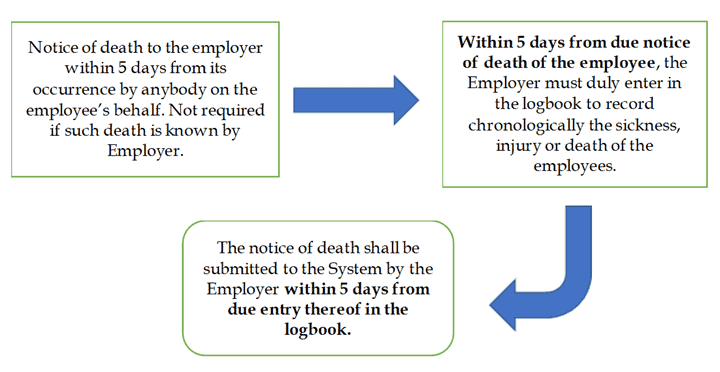Company Liability for Work-related Death
Death can strike at any time, even while at work. Indeed, dealing with death is a painful experience, most especially for the heirs and loved ones of the deceased. However, the company is not spared with dealing with death of an employee, most especially where the demise of an employee happens while at work.
For purposes of ensuring that a Company will not be held liable in case an employee dies while at work, or for a cause that which can be considered work-related, the following procedures should be followed:

Keeping a Logbook is Required by Law
Basically, you should ensure that you:
1) Keep a logbook of sickness, injury, or death of their employees;
2) To record in the logbook the names of the employees, dates, and places of the contingency and absences, within five (5) days from notice or knowledge of the occurrence of the contingency; and
3) To report to the Social Security System (SSS) within five (5) days after entry in the logbook, those contingencies which the employer deems to be work-connected.
Please prepare the foregoing documents and submit them on time so that the company will not be held liable by the Employee’s Compensation Commission (ECC). Under Presidential Decree No. 626, the most important participation of any employer in case of work related sickness, injury, or death, is the company’s obligation to maintain and to record such occurrences in the company. Therefore, keeping a logbook and ensuring that the necessary reports are filed timely, are crucial acts, without which, a company may be help liable by the ECC.
The Company can be Directly Liable for Work-Related Death
Under Article 203 (c) of Presidential Decree No. 626, as amended (renumbered to Article 211):
“Should any employer fail to record in the logbook an actual sickness, injury or death of any of his employees within the period prescribed herein, give false information or withhold material information already in his possession, he shall be held liable for fifty per cent of the lump sum equivalent of the income benefit to which the employee may be found to be entitled, the payment of which shall accrue to the State Insurance Fund.
(d) In case of payment of benefits for a claim which is later determined to be fraudulent and the employer is found to be a party to the fraud, such employer shall reimburse the System the full amount of the compensation paid.”
The ECC Determines if an Employee Death is Work-Related and therefore Compensable
It will depend on the SSS and the ECC if the death of the employee can be considered work-related. For this purpose, it should be noted that Heart Attack, as a cause of death, is compensable under the List of Occupational Diseases of the ECC. Any of the following conditions must be proven:
- The heart disease must be known to be present during employment and there must be proof that an acute exacerbation was clearly precipitated by the unusual strain by reasons of the nature of the employee’s work.
- The strain of work that brings about an acute attack must be of sufficient severity and must be followed within 24 hours by the clinical signs of a cardiac insult to constitute causal relationship.
- If a person who was apparently asymptomatic before being subjected to strain at work showed signs and symptoms of cardiac impairment during the performance of his work and such symptoms and signs persisted, it is reasonable to claim a causal relationship subject to the following conditions:
- If a person is a known hypertensive, it must be proven that this hypertension was controlled and that he was compliant with treatment.
- If a person is not known to be hypertensive during his employment, his previous health examination must show normal results in all of the following, but not limited to: blood pressure, chest X-ray, electrocardiogram (ECG)/treadmill exam, CBC and urinalysis.
- A history of substance abuse must be totally ruled out.
Considering that the employee died while on duty and reporting for work, it may be presumed that his death is work-related. Again, however, it is the burden of his heirs to prove this.
Effects of Compliance and Non-Compliance
As previously mentioned, if the employer fails to maintain a record in the logbook of the occurrence of an actual sickness, injury or death, gives false information or refuses to provide necessary information for the ECC to determine the compensability of a claim, the company stands to be liable for fifty percent of the lump sum income benefit to be received by the employee, or in case of the latter’s death, his or her beneficiaries.
On the other hand, where a claim that is timely filed and duly supported by the necessary information and reports, is accepted by the ECC, the beneficiary or beneficiaries of the employee who passed away will be entitled to death benefits, which includes a funeral benefit/grant which shall be paid to help defray the cost of funeral expenses where an employee passes away for a work-related injury, and an EC death pension. Note that a claim made by the heirs of employee who passed away due to a work-related injury is not barred from receiving benefits under the SSS Social Security Program.
About Nicolas and De Vega Law Offices
If you want to learn more about labor-related legal issues or need help in labor matters, we can help you. Nicolas and De Vega Law Offices is a full-service law firm in the Philippines. You may visit us at the 16th Flr., Suite 1607 AIC Burgundy Empire Tower, ADB Ave., Ortigas Center, 1605 Pasig City, Metro Manila, Philippines. You may also call us at +632 84706126, +632 84706130, +632 84016392 or e-mail us at [email protected]. Visit our website https://ndvlaw.com.









